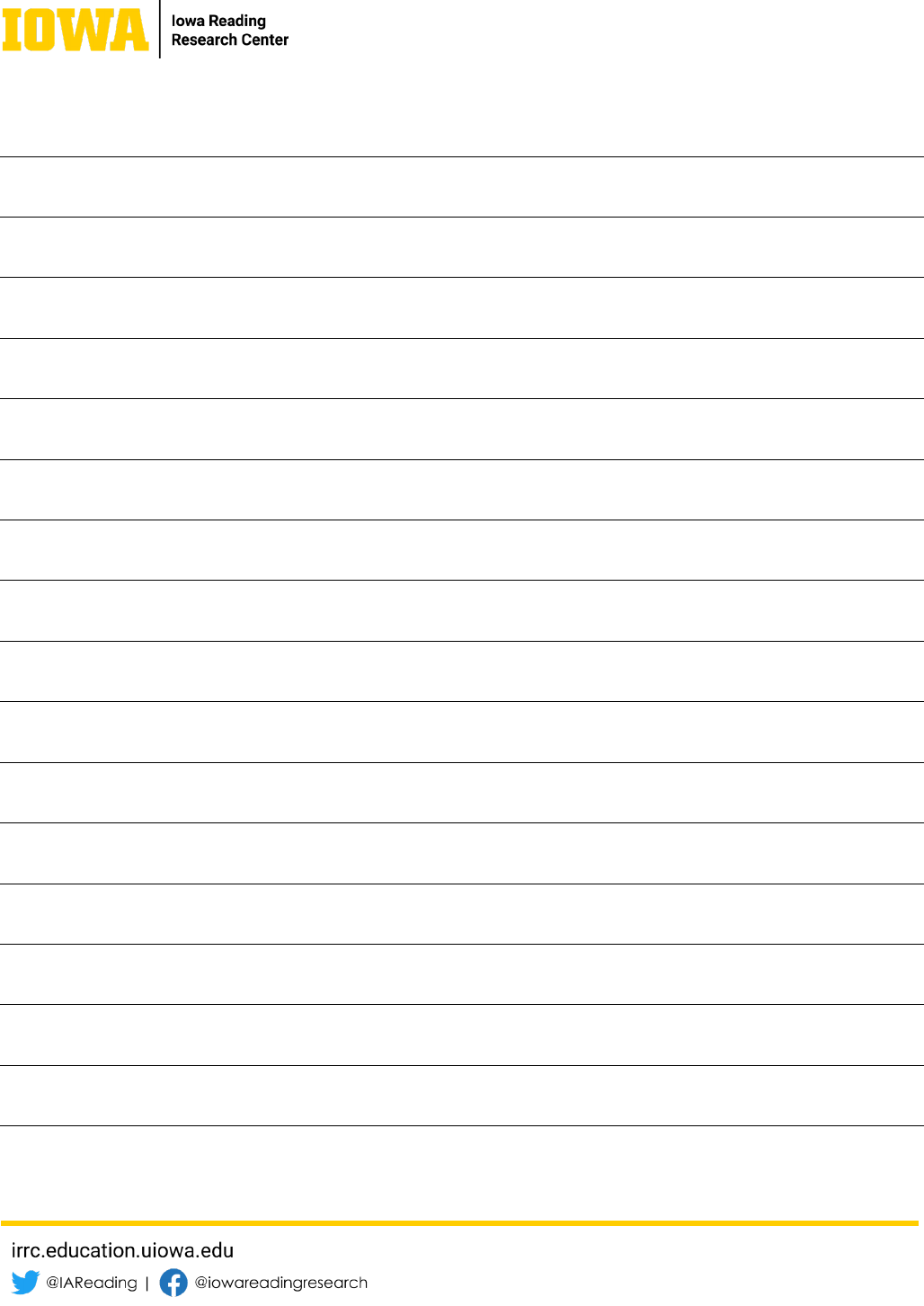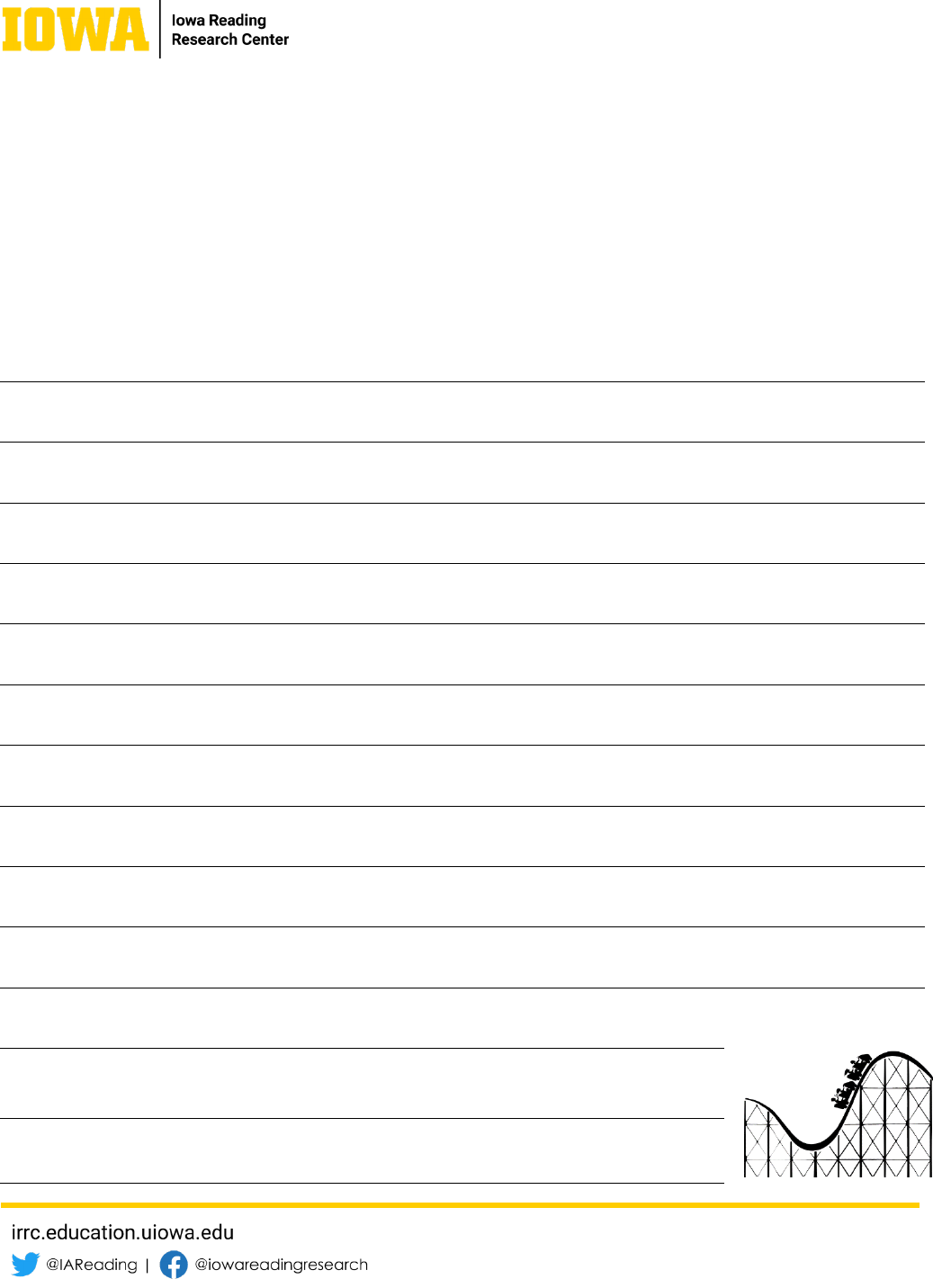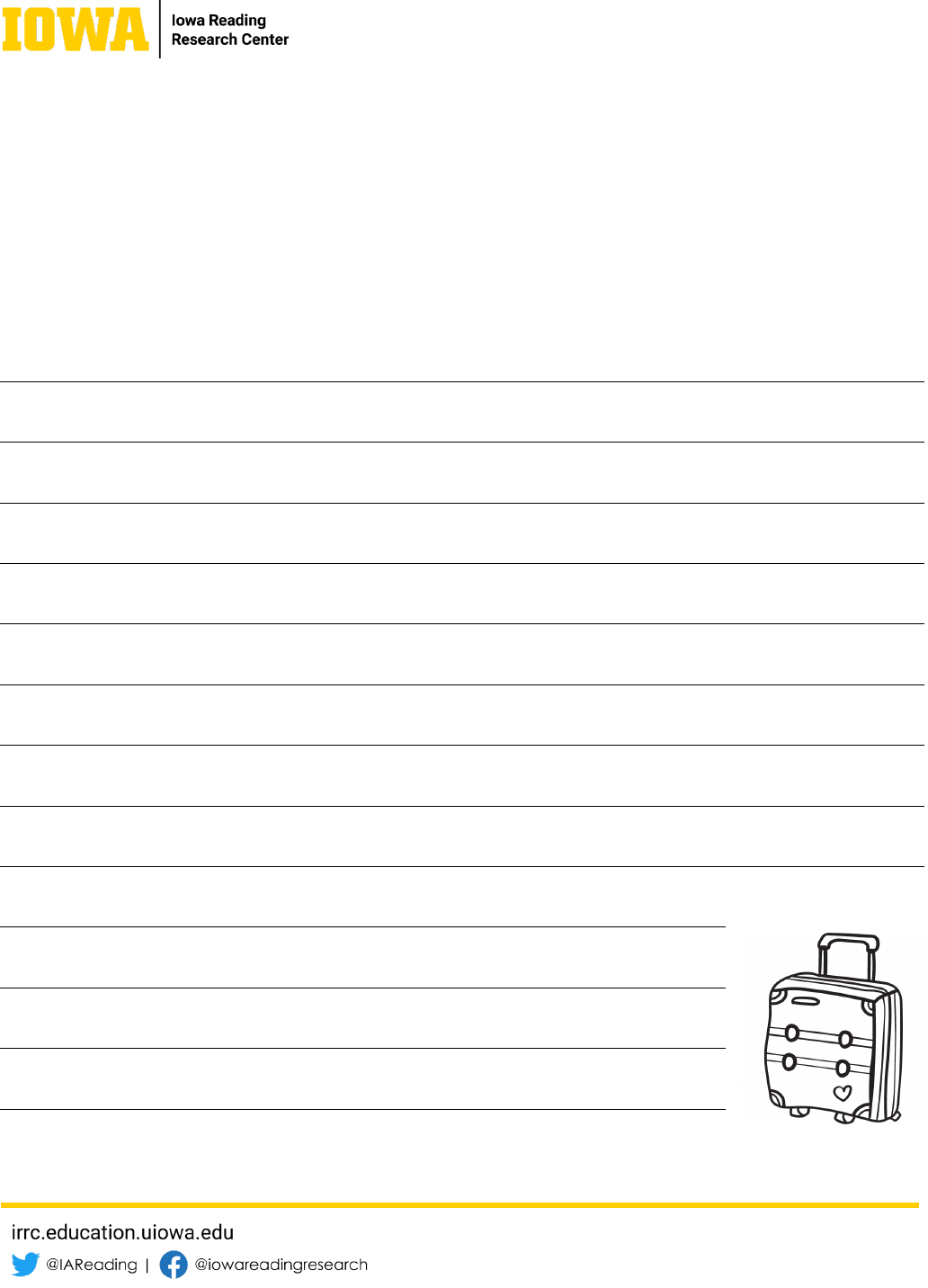
Summer Writing Prompts
Grades 6–8
As soon as the bell rings on the last day of the academic year, most students turn their attention toward
all the fun things they are going to do during their summer break. This enthusiasm for summer can
actually be used as a source of motivation for writing that will keep their literacy skills sharp!
Practicing responding to creative writing prompts at home can help students strengthen skills such as
crafting a narrative, establishing a clear sequence of events, developing an argument, and more. Creative
writing can also help young students develop stronger reading skills, especially when they are
encouraged to read their written responses aloud.
This guide includes summer-themed creative fiction and nonfiction writing prompts for adolescents in
Grades 6-8. While originally intended for use in the home during summer, these prompts would also be
appropriate for classroom use. The prompts were written to encourage responders to draw from various
literacy skills included in the Common Core ELA Writing Standards.
Reflection and Feedback—Suggestions for Caregivers
and Educators
When administering these prompts, provide adolescents with ample time to respond thoroughly and
carefully. After writing, there are a few different feedback methods that may be helpful.
Independent Reflection
• Encourage writers to go back over what they have written to check for spelling,
grammar, or logical errors.
• Encourage writers to read their written responses aloud. Some may have an
easier time hearing mistakes than seeing them on the page.
Peer Feedback
• If multiple adolescents are participating in this activity, encourage them to read one
another’s responses. Then, have them share what they liked about the other writers’
responses, and any questions they have about them.
Caregiver/Educator Feedback
• Read over the responses. Check for the following elements:
o Do their responses effectively address the question of the prompt?

o Did they structure their narratives with a clear progression of events
and/or ideas?
o Did they successfully implement narrative techniques such as dialogue,
descriptive language, and sensory details?
o Do they back up any argumentative claims with logical supporting
details?
o Do their responses include clear and effective conclusions?
o Did they demonstrate repeated or consistent mechanical errors, such as
issues with spelling, sentence structure, or punctuation? If so, provide corrective
feedback.
• Pick one or two areas of feedback to highlight for your writers and take time to
discuss them together. You may be able to find additional resources on the web to
provide practice opportunities in particular areas where improvement is needed. Be
sure to also point out a few things that they are doing well in their writing.
Lastly, celebrate the writing process! Encourage writers to share their responses with friends, family
members, and other loved ones. Perhaps they could send a handwritten copy of their response to a
grandparent or call up a cousin and read what they wrote over the phone. And if a writer seems
passionate about a specific prompt or topic, encourage them to keep writing about it, either via more
guided practice or as something to do in their free time!
Additional Resources
• For more information on writing prompts, read our Understanding and
Responding to Writing Prompts Guide.

Grades 6-8 Writing Prompts
The writing prompts that are listed below are also included on the pages that follow on lined sheets you
can print and hand out to adolescents to write their responses.
Fiction
Sometimes in the summer it is just too hot! Write a story that tells about a person who comes up with a
creative way to keep cool in the summer. Make sure to use transition words to organize the sequence of
events as they occur. For some people, summer is the season of campfires and ghost stories!
Write a fictional creepy ghost or monster story that would be perfect to tell at your next campfire. Use as
many descriptive details as you can. In the summer, many people like to visit amusement parks.
Using your imagination, write a story that tells about the wackiest amusement park you can think of. Be
sure to describe what the park looks like, what you can do there, and what kinds of people like to visit.
Do you like to go camping during the summer? Using your imagination, develop a fictional narrative that
tells about a camping trip gone terribly wrong. Be sure to include descriptive details, unique characters,
and a clear order of events.
Summer is not all fun in the sun. Sometimes, the summer months can bring rain, and even
thunderstorms! Write a creative story that tells about a severe storm. Be sure to use descriptive language
and sensory details to describe the event.
Nonfiction
One way to beat the summer heat is to take a trip to the air-conditioned movie theater! Write a nonfiction
essay telling about your favorite kinds of movies. Be sure to explain why you like these kinds of movies
using convincing details.
Several different holidays are celebrated during the summer months. Write a nonfiction narrative about
the different holiday traditions your family takes part in over the summer. Be sure to give supporting
details to describe each holiday tradition.
Summer can be a great opportunity to spend time with your friends. Write a nonfiction narrative telling
about a fun summer activity you like to do with your friends. Where do you go to do this activity? Who do
you do it with? Why do you like to do it? Be sure to use supporting details and to organize your thoughts
in a logical way.
Many people take fun trips during the summer. Write a nonfiction narrative telling about the best
vacation you’ve ever gone on, from the beginning of the trip to when you returned home. Be sure to use
descriptive language and sensory details while writing about what happened.

Summer can be a good time to stop and reflect on all of the things that have happened to you in the
previous school year. Write a nonfiction narrative telling about your favorite memory from the last school
year. Use the 5 Ws: who was there, what happened, when was it, where was it, and why is it your favorite?
Be sure to use supporting details and to organize your thoughts in a logical way.

Grades: 6-8 Category: Fiction
Name: _____________________________________ Date: _______________________
Sometimes in the summer it is just too hot! Write a story that tells about a person
who comes up with a creative way to keep cool in the summer. Make sure to use
transition words to organize the sequence of events as they occur.


Grades: 6-8 Category: Fiction
Name: _____________________________________ Date: _______________________
For some people, summer is the season of campfires and ghost stories! Write a
fictional creepy ghost or monster story that would be perfect to tell at your next
campfire. Use as many descriptive details as you can.


Grades: 6-8 Category: Fiction
Name: _____________________________________ Date: _______________________
In the summer, many people like to visit amusement parks. Using your
imagination, write a story that tells about the wackiest amusement park you can
think of. Be sure to describe what the park looks like, what you can do there, and
what kinds of people like to visit.


Grades: 6-8 Category: Fiction
Name: _____________________________________ Date: _______________________
Do you like to go camping during the summer? Using your imagination, develop a
fictional narrative that tells about a camping trip gone terribly wrong. Be sure to
include descriptive details, unique characters, and a clear order of events.


Grades: 6-8 Category: Fiction
Name: _____________________________________ Date: _______________________
Summer is not all fun in the sun. Sometimes, the summer months can bring rain,
and even thunderstorms! Write a creative story that tells about a severe storm.
Be sure to use descriptive language and sensory details to describe the event.


Grades: 6-8 Category: Nonfiction
Name: _____________________________________ Date: _______________________
One way to beat the summer heat is to take a trip to the air-conditioned movie
theater! Write a nonfiction essay telling about your favorite kinds of movies. Be
sure to explain why you like these kinds of movies using convincing details.


Grades: 6-8 Category: Nonfiction
Name: _____________________________________ Date: _______________________
Several different holidays are celebrated during the summer months. Write a
nonfiction narrative about the different holiday traditions your family takes part
in over the summer. Be sure to give supporting details to describe each holiday
tradition.


Grades: 6-8 Category: Nonfiction
Name: _____________________________________ Date: _______________________
Summer can be a great opportunity to spend time with your friends. Write a
nonfiction narrative telling about a fun summer activity you like to do with your
friends. Where do you go to do this activity? Who do you do it with? Why do you
like to do it? Be sure to use supporting details and to organize your thoughts in a
logical way.


Grades: 6-8 Category: Nonfiction
Name: _____________________________________ Date: _______________________
Many people take fun trips during the summer. Write a nonfiction narrative
telling about the best vacation you’ve ever gone on, from the beginning of the trip
to when you returned home. Be sure to use descriptive language and sensory
details while writing about what happened.


Grades: 6-8 Category: Nonfiction
Name: _____________________________________ Date: _______________________
Summer can be a good time to stop and reflect on all of the things that have
happened to you in the previous school year. Write a nonfiction narrative telling
about your favorite memory from the last school year. Use the 5 Ws: who was
there, what happened, when was it, where was it, and why is it your favorite? Be
sure to use supporting details and to organize your thoughts in a logical way.

